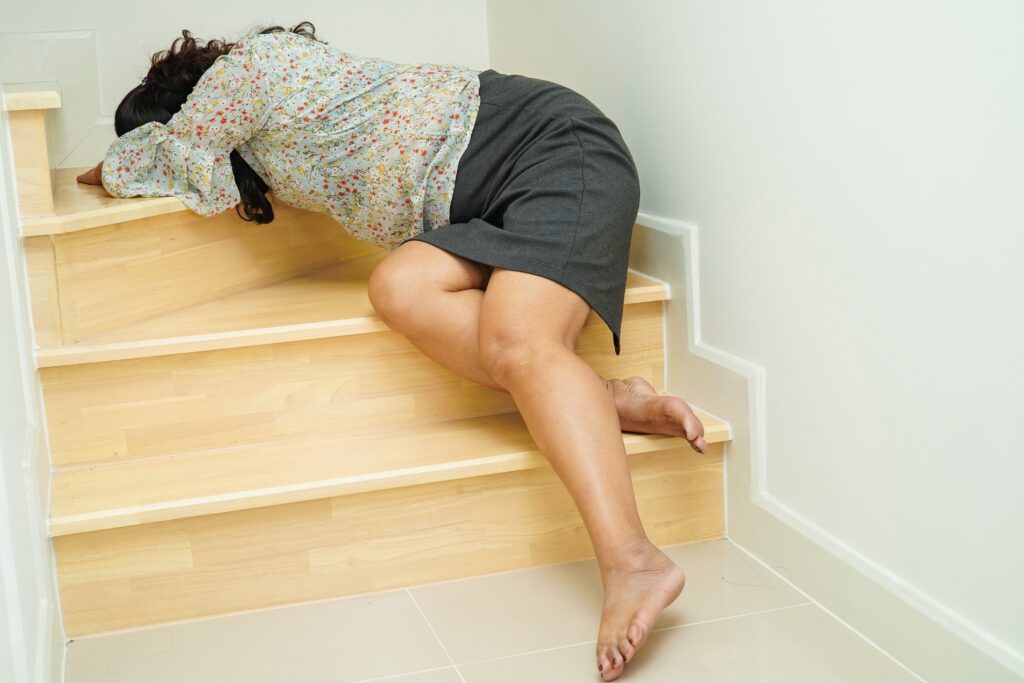Slip and fall claims get denied all the time, and it’s not because the insurance company is “confused” or “reviewing your case thoroughly.” It’s because denying claims saves them money. The moment you file, their job becomes finding reasons to say no.
The good news is, a denied claim doesn’t mean you’re out of options. You can fight back, but it takes evidence, strategy, and legal muscle.
At Sliporfall.com, we know how to deal with insurance companies that play hardball. Call us at 866-597-0009. Let our Florida personal injury lawyer make sure you get the compensation you deserve.
Common Reasons for Slip and Fall Claim Denials

Insurance companies have mastered the art of saying no. If they think they can save a dollar by denying your slip and fall claim, they’ll pounce on the opportunity. Let’s break down their favorite excuses:
1. Insufficient Evidence
The first thing an insurance adjuster will do is look for gaps in your story. If you didn’t take photos of the accident scene, didn’t document the hazard, or didn’t collect witness information, they’ll claim the incident never happened—or at least that they can’t verify it. They’ll argue there’s no proof the property owner was negligent or that the hazard even existed. Without evidence, your claim becomes an easy target for dismissal.
How they spin it:
- “There’s no photo showing the spill on the floor.”
- “The medical records don’t clearly connect the injuries to this specific accident.”
- “We didn’t receive witness statements to back up your version of events.”
2. Policy Exclusions
Property insurance policies are loaded with fine print, and exclusions are their favorite loophole. They’ll comb through the policy to argue that your accident doesn’t meet the criteria for coverage. For example, they might claim the property owner wasn’t liable for “natural accumulations” like rainwater tracked indoors or that the injured party entered a restricted area.
Common examples of exclusions:
- Hazards that are considered “open and obvious,” like a clearly visible puddle.
- Situations where the injured party ignored warning signs (e.g., a “Wet Floor” sign).
- Accidents in areas deemed off-limits to the public.
3. Missed Deadlines
Florida law provides a clear timeframe for filing claims, and missing it can wreck your case. Under Florida Statutes § 627.70132, claimants must notify the insurer of a loss within a specified period (typically set by the insurance policy). If you miss this deadline—even by a day—the insurer has grounds to deny your claim outright.
How to avoid it:
- File the claim immediately after the incident. Waiting too long gives insurers an excuse to reject it.
- Keep copies of all correspondence to show that you acted within the required timeframe.
4. Disputed Liability
Insurance companies love to play the blame game. If there’s even a hint that you might share fault for the accident, they’ll argue you were careless. Florida operates under a pure comparative negligence rule (Florida Statutes § 768.81), which means your compensation could be reduced based on your percentage of fault. Worse, insurers might deny your claim entirely, claiming the property owner had no responsibility at all.
Examples of disputed liability:
- They argue you weren’t paying attention and tripped over something obvious.
- They claim the hazard was temporary, and the property owner didn’t have enough time to address it.
- They assert the accident occurred in an area where you weren’t supposed to be.
5. Pre-Existing Conditions
If your medical records show a history of injuries or conditions similar to those caused by the fall, the insurer will latch onto that like a dog with a bone. They’ll argue that your injuries weren’t caused by the accident—or that the fall didn’t make them worse.
What they’ll say:
- “Your medical history shows chronic back pain, so this injury wasn’t caused by the fall.”
- “The records don’t provide clear evidence that the accident aggravated a pre-existing condition.”
Steps to Take After a Claim Denial
When your slip and fall claim gets denied, the insurance company wants you to give up. They rely on your frustration to make their decision stick. But giving up isn’t your only option. Denials can be challenged, and with the right moves, you can turn the tables.
1. Analyze the Denial Letter

The denial letter spells out why the insurer refused your claim, often citing specific reasons like missing evidence or policy exclusions. Before you respond, dissect the letter line by line.
- Look for specific denial codes or policy references: These tell you whether the insurer rejected your claim on procedural grounds (like missed deadlines) or substantive ones (like liability disputes).
- Spot vague language: Phrases like “insufficient proof” or “does not meet policy requirements” demand further clarification. Call the insurer and ask them to explain exactly what’s missing.
- Identify misinterpretations: Insurers sometimes misapply their own policies or misrepresent the facts. Catching these errors strengthens your case.
2. Request Additional Information
Don’t let their initial explanation be the final word. Florida law permits you to request access to certain documents related to your claim. Insurers must provide relevant information under Florida Administrative Code Rule 69O-166.024, which governs the fair handling of claims.
- Ask for copies of any internal reports or evaluations the insurer used to assess your claim.
- Request a detailed explanation of how they determined liability or denied coverage.
- Keep a record of all correspondence, including dates, names, and what was discussed.
3. Gather and Strengthen Evidence
If the insurer claims your case lacks proof, then build your arsenal. Even after a denial, you can still collect and submit additional evidence to reinforce your claim.
- Accident Scene Photos: Return to the location of your fall, if possible, and take photos of any hazards. If the condition has been fixed, look for security footage or ask witnesses for descriptions of what the hazard looked like.
- Medical Records: Obtain detailed reports from your doctor that specifically connect your injuries to the slip and fall. Have your physician explain how the accident caused or worsened the injuries.
- Witness Statements: If you didn’t collect statements immediately after the accident, reach out to anyone who saw what happened. Written statements from third parties carry weight in appeals.
- Maintenance Records: If your fall happened on commercial property, request maintenance logs to check if the hazard was reported or ignored.
4. Consult a Personal Injury Attorney
At this point, you’ve done the groundwork, but insurers rarely back down without pressure. A personal injury attorney steps in to level the playing field.
- Attorneys understand the tactics insurers use to delay or deny claims. They know what evidence holds up in court and how to frame an appeal that insurers take seriously.
- A lawyer can subpoena additional records, like internal communications from the insurer or maintenance logs from the property owner. These documents may uncover negligence that wasn’t immediately obvious.
- Most importantly, an attorney shows the insurer you mean business. When a claim is backed by legal representation, the stakes shift—insurers know a lawsuit is on the table.
5. Prepare and Submit an Appeal
Your attorney will file an appeal to challenge the insurer’s decision head-on. Appeals require precision, both in following the insurer’s process and presenting a compelling case.
- Adhere to deadlines: Florida law doesn’t mandate appeal timelines, but insurers set strict ones. Missing this deadline could close your case permanently.
- Write a detailed appeal letter: Your attorney will address the reasons for denial point by point. For instance:
- If the denial claims lack of evidence, they will submit new documentation or explain why the existing evidence is valid.
- If the denial cites policy exclusions, they will argue why those exclusions don’t apply (e.g., the hazard wasn’t “open and obvious”).
- Attach all supporting evidence: Include photos, medical records, witness statements, and any other documents that strengthen your argument.
6. Explore Other Legal Options
Sometimes, appeals don’t work—especially when insurers dig in their heels. At this stage, you may need to escalate by filing a lawsuit against the responsible party.
- Florida’s statute of limitations for personal injury cases (§ 95.11) allows you four years from the date of the accident to file a lawsuit. If you’ve exhausted your appeal options, this is your next move.
- Filing a lawsuit often forces the insurer to reevaluate your claim, especially if new evidence emerges during the litigation process.
- A lawsuit also shifts the focus from negotiating with an insurer to proving liability in court, where their tactics face more scrutiny.
Tips to Strengthen Your Claims
The best way to counter their tactics is to build a case they can’t easily poke holes in. The more prepared you are, the harder it becomes for them to deny your claim again without exposing their bias.
Seek Medical Attention Immediately

If you haven’t already, go visit your doctor. You might feel fine after a fall, but adrenaline masks injuries. Besides, insurers won’t take you seriously if you skip medical treatment. The link between your injuries and the accident starts with that first doctor visit.
- Get a Full Medical Evaluation: Even if your injuries seem minor, let a doctor determine the extent of the damage. Slip and fall accidents often lead to injuries that worsen over time, like herniated discs or traumatic brain injuries.
- Request Detailed Records: Medical records should include a clear diagnosis, treatment plan, and the doctor’s opinion on how the accident caused your injuries.
Skipping this step gives insurers room to argue that your injuries aren’t severe—or worse, that they didn’t happen at all.
Be Consistent with Your Story
Every word you say about the accident matters. Insurers will compare your account across the initial report, witness statements, and medical records, looking for inconsistencies.
- Stick to the Facts: Don’t exaggerate or downplay the situation. A small contradiction—like saying you slipped on “water” in one account and “soap” in another—can undermine your credibility.
- Coordinate with Witnesses: If someone saw your fall, ask them to describe what happened in their own words. Their account should align with yours, but don’t coach them—they need to stay authentic.
Avoid Premature Settlements
After your accident, the property owner’s insurer might contact you with a quick settlement offer. It’s tempting to take the money and move on, but these offers usually undervalue your claim.
- Don’t Sign Anything Without Legal Advice: Accepting a settlement often means waiving your right to pursue further compensation.
- Assess the Long-Term Costs: Consider future medical expenses, lost wages, and the potential for ongoing pain or disability before accepting any offer.
Watch What You Say and Do
Insurers monitor your actions more closely than you think. Anything you say—or post online—can and will be used against you.
- Be Careful on Social Media: Posting photos of yourself hiking or playing sports after the accident undermines your claim. Insurers could argue that your injuries aren’t as bad as you claim.
- Limit Communication with Insurers: Keep conversations brief and factual. If they ask leading questions, like “Were you distracted when you fell?” politely refer them to your attorney.
Fight Back Against Insurance Games with Sliporfall.com
Insurance companies bet on you giving up. They hope you’ll accept their denials and walk away. But you don’t have to play their game. With the right evidence and the right team, you hold the power to fight back and win.
Call Sliporfall.com today at 866-597-0009. Let us handle the insurance tactics while you focus on getting better.